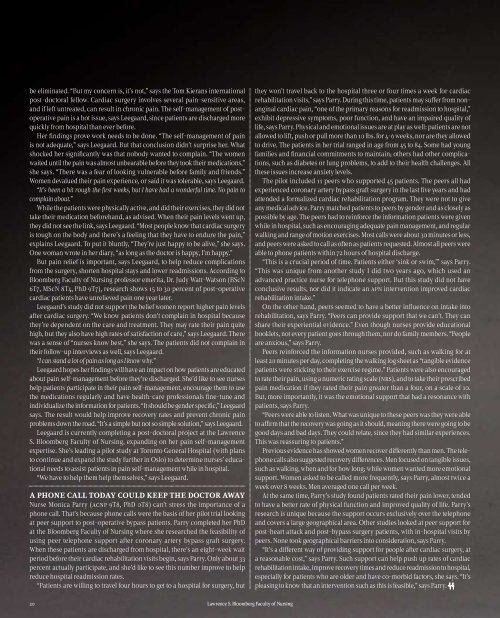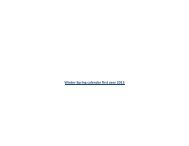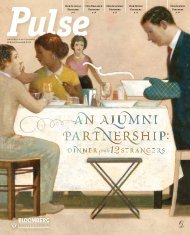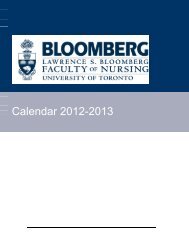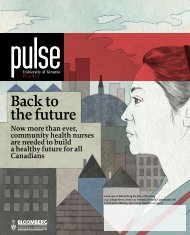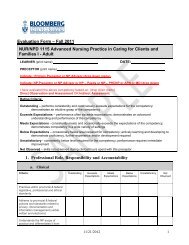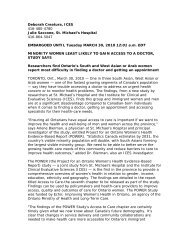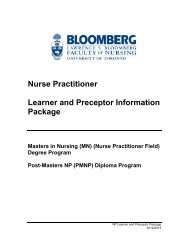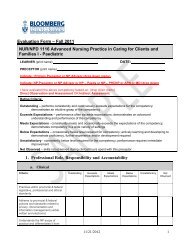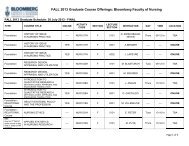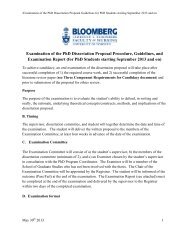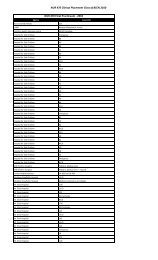Read more - Lawrence S. Bloomberg Faculty of Nursing - University ...
Read more - Lawrence S. Bloomberg Faculty of Nursing - University ...
Read more - Lawrence S. Bloomberg Faculty of Nursing - University ...
You also want an ePaper? Increase the reach of your titles
YUMPU automatically turns print PDFs into web optimized ePapers that Google loves.
e eliminated. “But my concern is, it’s not,” says the Tom Kierans international<br />
post-doctoral fellow. Cardiac surgery involves several pain-sensitive areas,<br />
and if left untreated, can result in chronic pain. The self-management <strong>of</strong> postoperative<br />
pain is a hot issue, says Leegaard, since patients are discharged <strong>more</strong><br />
quickly from hospital than ever before.<br />
Her ndings prove work needs to be done. “The self-management <strong>of</strong> pain<br />
is not adequate,” says Leegaard. But that conclusion didn’t surprise her. What<br />
shocked her signicantly was that nobody wanted to complain. “The women<br />
waited until the pain was almost unbearable before they took their medications,”<br />
she says. “There was a fear <strong>of</strong> looking vulnerable before family and friends.”<br />
Women devalued their pain experience, or said it was tolerable, says Leegaard.<br />
“It’s been a bit rough the rst weeks, but I have had a wonderful time. No pain to<br />
complain about.”<br />
While the patients were physically active, and did their exercises, they did not<br />
take their medication beforehand, as advised. When their pain levels went up,<br />
they did not see the link, says Leegaard. “Most people know that cardiac surgery<br />
is tough on the body and there’s a feeling that they have to endure the pain,”<br />
explains Leegaard. To put it bluntly, “They’re just happy to be alive,” she says.<br />
One woman wrote in her diary, “as long as the doctor is happy, I’m happy.”<br />
But pain relief is important, says Leegaard, to help reduce complications<br />
from the surgery, shorten hospital stays and lower readmissions. According to<br />
<strong>Bloomberg</strong> <strong>Faculty</strong> <strong>of</strong> <strong>Nursing</strong> pr<strong>of</strong>essor emerita, Dr. Judy Watt-Watson (BScN<br />
6T7, MScN 8T4, PhD 9T7), research shows 15 to 30 percent <strong>of</strong> post-operative<br />
cardiac patients have unrelieved pain one year later.<br />
Leegaard’s study did not support the belief women report higher pain levels<br />
after cardiac surgery. “We know patients don’t complain in hospital because<br />
they’re dependent on the care and treatment. They may rate their pain quite<br />
high, but they also have high rates <strong>of</strong> satisfaction <strong>of</strong> care,” says Leegaard. There<br />
was a sense <strong>of</strong> “nurses know best,” she says. The patients did not complain in<br />
their follow-up interviews as well, says Leegaard.<br />
“I can stand a lot <strong>of</strong> pain as long as I know why.”<br />
Leegaard hopes her ndings will have an impact on how patients are educated<br />
about pain self-management before they’re discharged. She’d like to see nurses<br />
help patients participate in their pain self-management, encourage them to use<br />
the medications regularly and have health-care pr<strong>of</strong>essionals ne-tune and<br />
individualize the information for patients. “It should be gender specic,” Leegaard<br />
says. The result would help improve recovery rates and prevent chronic pain<br />
problems down the road. “It’s a simple but not so simple solution,” says Leegaard.<br />
Leegaard is currently completing a post-doctoral project at the <strong>Lawrence</strong><br />
S. <strong>Bloomberg</strong> <strong>Faculty</strong> <strong>of</strong> <strong>Nursing</strong>, expanding on her pain self-management<br />
expertise. She’s leading a pilot study at Toronto General Hospital (with plans<br />
to continue and expand the study further in Oslo) to determine nurses’ educational<br />
needs to assist patients in pain self-management while in hospital.<br />
“We have to help them help themselves,” says Leegaard.<br />
a phone call today could keep the doctor away<br />
Nurse Monica Parry (acnp 9T8, PhD 0T8) can’t stress the importance <strong>of</strong> a<br />
phone call. That’s because phone calls were the basis <strong>of</strong> her pilot trial looking<br />
at peer support to post-operative bypass patients. Parry completed her PhD<br />
at the <strong>Bloomberg</strong> <strong>Faculty</strong> <strong>of</strong> <strong>Nursing</strong> where she researched the feasibility <strong>of</strong><br />
using peer telephone support after coronary artery bypass graft surgery.<br />
When these patients are discharged from hospital, there’s an eight-week wait<br />
period before their cardiac rehabilitation visits begin, says Parry. Only about 33<br />
percent actually participate, and she’d like to see this number improve to help<br />
reduce hospital readmission rates.<br />
“Patients are willing to travel four hours to get to a hospital for surgery, but<br />
they won’t travel back to the hospital three or four times a week for cardiac<br />
rehabilitation visits,” says Parry. During this time, patients may suffer from nonanginal<br />
cardiac pain, “one <strong>of</strong> the primary reasons for readmission to hospital,”<br />
exhibit depressive symptoms, poor function, and have an impaired quality <strong>of</strong><br />
life, says Parry. Physical and emotional issues are at play as well: patients are not<br />
allowed to lift, push or pull <strong>more</strong> than 10 lbs. for 4-6 weeks, nor are they allowed<br />
to drive. The patients in her trial ranged in age from 45 to 84. Some had young<br />
families and nancial commitments to maintain; others had other complications,<br />
such as diabetes or lung problems, to add to their health challenges. All<br />
these issues increase anxiety levels.<br />
The pilot included 11 peers who supported 45 patients. The peers all had<br />
experienced coronary artery bypass graft surgery in the last ve years and had<br />
attended a formalized cardiac rehabilitation program. They were not to give<br />
any medical advice. Parry matched patients to peers by gender and as closely as<br />
possible by age. The peers had to reinforce the information patients were given<br />
while in hospital, such as encouraging adequate pain management, and regular<br />
walking and range <strong>of</strong> motion exercises. Most calls were about 30 minutes or less,<br />
and peers were asked to call as <strong>of</strong>ten as patients requested. Almost all peers were<br />
able to phone patients within 72 hours <strong>of</strong> hospital discharge.<br />
“This is a crucial period <strong>of</strong> time. Patients either ‘sink or swim,’” says Parry.<br />
“This was unique from another study I did two years ago, which used an<br />
advanced practice nurse for telephone support. But this study did not have<br />
conclusive results, nor did it indicate an apn intervention improved cardiac<br />
rehabilitation intake.”<br />
On the other hand, peers seemed to have a better inuence on intake into<br />
rehabilitation, says Parry. “Peers can provide support that we can’t. They can<br />
share their experiential evidence.” Even though nurses provide educational<br />
booklets, not every patient goes through them, nor do family members. “People<br />
are anxious,” says Parry.<br />
Peers reinforced the information nurses provided, such as walking for at<br />
least 20 minutes per day, completing the walking log sheet as “tangible evidence<br />
patients were sticking to their exercise regime.” Patients were also encouraged<br />
to rate their pain, using a numeric rating scale (nrs), and to take their prescribed<br />
pain medication if they rated their pain greater than a four, on a scale <strong>of</strong> 10.<br />
But, <strong>more</strong> importantly, it was the emotional support that had a resonance with<br />
patients, says Parry.<br />
“Peers were able to listen. What was unique to these peers was they were able<br />
to afrm that the recovery was going as it should, meaning there were going to be<br />
good days and bad days. They could relate, since they had similar experiences.<br />
This was reassuring to patients.”<br />
Previous evidence has showed women recover differently than men. The telephone<br />
calls also suggested recovery differences. Men focused on tangible issues,<br />
such as walking, when and for how long; while women wanted <strong>more</strong> emotional<br />
support. Women asked to be called <strong>more</strong> frequently, says Parry, almost twice a<br />
week over 8 weeks. Men averaged one call per week.<br />
At the same time, Parry’s study found patients rated their pain lower, tended<br />
to have a better rate <strong>of</strong> physical function and improved quality <strong>of</strong> life. Parry’s<br />
research is unique because the support occurs exclusively over the telephone<br />
and covers a large geographical area. Other studies looked at peer support for<br />
post-heart attack and post-bypass surgery patients, with in-hospital visits by<br />
peers. None took geographical barriers into consideration, says Parry.<br />
“It’s a different way <strong>of</strong> providing support for people after cardiac surgery, at<br />
a reasonable cost,” says Parry. Such support can help push up rates <strong>of</strong> cardiac<br />
rehabilitation intake, improve recovery times and reduce readmission to hospital,<br />
especially for patients who are older and have co-morbid factors, she says. “It’s<br />
pleasing to know that an intervention such as this is feasible,” says Parry.<br />
20 <strong>Lawrence</strong> S. <strong>Bloomberg</strong> <strong>Faculty</strong> <strong>of</strong> <strong>Nursing</strong>


